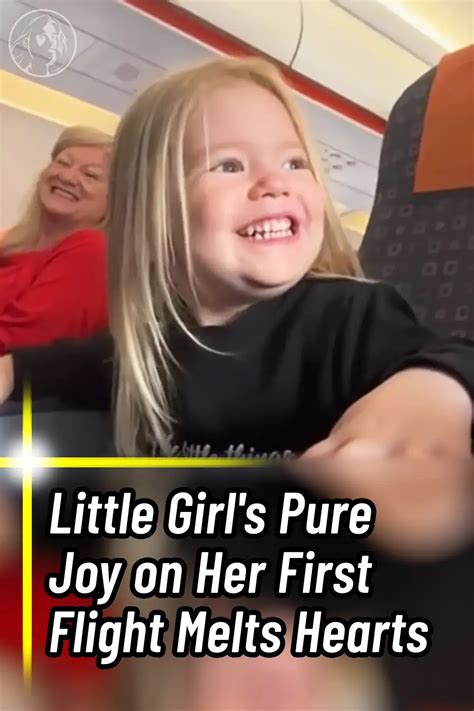
A five-month-old baby named Penelope, whose mid-flight fussiness prompted a fellow passenger to relocate, seemingly apologized for her behavior with a heartfelt “sorry” that has gone viral, melting hearts online and averting potential in-flight drama. The incident, captured in a video shared by Penelope’s mother, Andrea Byrd, showcases the infant’s adorable attempt to express remorse, highlighting the lighter side of air travel and the power of human connection.
Infant’s Apology Goes Viral After In-Flight Fuss
Andrea Byrd, traveling with her five-month-old daughter Penelope, experienced a common parental concern: a fussy baby on a flight. After a fellow passenger opted to move seats due to Penelope’s crying, Byrd felt a wave of anxiety. However, what followed was unexpected. As Byrd recounted, Penelope, seemingly sensing the situation, began to vocalize what sounded remarkably like the word “sorry.”
Byrd, astounded by her daughter’s apparent empathy, captured the moment on video and shared it on social media. The video quickly went viral, garnering millions of views and sparking an outpouring of positive reactions. Commenters expressed admiration for Penelope’s seemingly precocious behavior and praised Byrd for her handling of the situation.
“I was so stressed because she was crying on the plane, and I was trying to calm her down,” Byrd explained. “When the man moved, I felt even worse. But then she started saying ‘sorry,’ and I couldn’t believe it. I had to record it.”
The video shows Penelope, wide-eyed and looking directly at the camera, repeatedly uttering a sound that closely resembles the word “sorry,” accompanied by a sweet, innocent expression. This charming display resonated with viewers worldwide, turning a potentially tense travel moment into a heartwarming viral sensation.
The Power of a Simple “Sorry”
The incident underscores the power of a simple apology, even from an infant. While it’s unlikely that Penelope fully grasped the concept of remorse, her vocalizations and demeanor conveyed a sense of contrition that resonated with viewers. The video also highlights the challenges parents face when traveling with young children and the importance of empathy and understanding from fellow passengers.
“It just shows that even a baby can teach us something about being kind and considerate,” Byrd commented. “I hope it reminds people to be a little more patient and understanding, especially when they see a parent struggling with a child.”
The story has sparked discussions about the etiquette of air travel with infants, the pressures faced by parents, and the universal appeal of adorable baby videos. Many viewers have shared their own experiences of traveling with young children, both positive and negative, creating a sense of community and shared understanding.
Expert Perspectives on Infant Vocalizations
While Penelope’s “sorry” is undeniably endearing, experts caution against attributing complex cognitive abilities to infants at such a young age. According to developmental psychologists, babies typically begin to understand and use words with intention around 12 months old. However, infants do begin to experiment with sounds and imitate language patterns much earlier.
Dr. Sarah Johnson, a child development specialist, explains, “At five months, babies are definitely experimenting with sounds and starting to mimic the sounds they hear around them. It’s possible that Penelope was simply imitating the sounds of her mother saying ‘sorry’ or hearing it in other contexts. It’s also possible that the sound just happened to resemble the word ‘sorry’ by chance.”
Regardless of the underlying cause, Dr. Johnson acknowledges the emotional impact of the video. “Even if it’s not a conscious apology, the fact that it sounds like ‘sorry’ is incredibly touching. It taps into our innate desire for connection and understanding, and it reminds us of the innocence and vulnerability of babies.”
Airline Reactions and Travel Tips for Parents
The viral video has also prompted reactions from airlines and travel experts, who are offering tips for parents traveling with young children. Many airlines provide resources such as bassinets, priority boarding for families, and dedicated family restrooms. Some airlines have even begun to offer “quiet zones” on flights, although these are often controversial.
Travel experts recommend the following tips for parents traveling with infants:
- Plan ahead: Book flights during off-peak hours when possible, and consider booking a seat with extra legroom or a bassinet.
- Pack strategically: Bring plenty of diapers, wipes, formula or breast milk, snacks, toys, and a change of clothes.
- Prepare for pressure changes: Offer a bottle or pacifier during takeoff and landing to help alleviate ear pressure.
- Be patient: Remember that babies are unpredictable, and try to stay calm and relaxed. Your attitude will influence your baby’s mood.
- Don’t be afraid to ask for help: Flight attendants and fellow passengers are often willing to lend a hand.
The Enduring Appeal of Heartwarming Stories
In a world often dominated by negative news, the story of Penelope’s “sorry” serves as a reminder of the power of human connection and the enduring appeal of heartwarming stories. It’s a reminder that even in the midst of stressful situations, moments of kindness and understanding can emerge, bringing smiles to faces and restoring faith in humanity. The video has tapped into a universal desire for positivity and has served as a welcome distraction from the challenges of daily life.
The broader impact of the viral video extends beyond mere entertainment. It has sparked conversations about empathy, understanding, and the challenges and joys of parenthood. It has also served as a valuable reminder of the importance of patience and compassion in our interactions with others, particularly in stressful environments like air travel.
The “sorry” incident serves as a case study in how a simple, seemingly insignificant moment can capture the attention of the world and generate a wave of positivity. The internet, often criticized for its negativity and divisiveness, has also demonstrated its ability to amplify acts of kindness and promote a sense of shared humanity.
Future Implications and Lessons Learned
While the long-term impact of Penelope’s viral video remains to be seen, it has undoubtedly left a lasting impression on those who have viewed it. It has also provided valuable lessons for parents, travelers, and anyone seeking to promote kindness and understanding in the world.
For parents, the video serves as a reminder that even in the most challenging moments, there is always the potential for connection and joy. It also highlights the importance of documenting these moments, as they can serve as a source of comfort and inspiration in the future.
For travelers, the video underscores the importance of empathy and patience, particularly when encountering families with young children. It reminds us that a little understanding can go a long way in making air travel a more pleasant experience for everyone.
And for the world at large, the story of Penelope’s “sorry” serves as a reminder of the power of kindness and the enduring appeal of heartwarming stories. It’s a reminder that even in the midst of chaos and uncertainty, there is always room for compassion and connection.
The viral video of Penelope’s apparent apology offers a brief but powerful respite from the often-negative news cycle. It is a reminder of the shared human experience, the challenges of parenthood, and the unexpected moments of joy that can emerge even in the most stressful situations. The video has not only entertained millions but has also sparked conversations about empathy, understanding, and the importance of kindness in our daily interactions.
More About Andrea Byrd and Penelope
Andrea Byrd, Penelope’s mother, has been overwhelmed by the positive response to the video. She has used her newfound platform to advocate for greater understanding and support for parents traveling with young children. She has also shared her own experiences as a mother and has offered advice to other parents facing similar challenges.
Byrd has expressed gratitude for the outpouring of support and has emphasized the importance of focusing on the positive aspects of the experience. She has also cautioned against overanalyzing Penelope’s behavior, emphasizing that she is simply a baby and that the video should be viewed as a lighthearted and heartwarming moment.
Penelope, meanwhile, remains blissfully unaware of her internet fame. She continues to grow and develop, bringing joy to her family and inspiring others with her adorable personality. Byrd plans to continue sharing updates about Penelope’s life on social media, while also respecting her privacy and ensuring that she has a normal and happy childhood.
The Psychology of Viral Content
The rapid spread of Penelope’s video highlights the complex psychology of viral content. Several factors contribute to a video’s virality, including its emotional appeal, relatability, and shareability.
Emotional appeal is a key driver of viral content. Videos that evoke strong emotions, such as joy, sadness, or surprise, are more likely to be shared. Penelope’s video evokes a sense of warmth and tenderness, which resonates with viewers.
Relatability is another important factor. Videos that depict common experiences or challenges are more likely to be shared. The challenges of traveling with young children are relatable to many parents, which contributed to the video’s widespread appeal.
Shareability is also crucial. Videos that are easy to share and that are likely to elicit a positive response from others are more likely to go viral. Penelope’s video is short, sweet, and easily shareable, making it ideal for social media platforms.
The Role of Social Media in Shaping Public Opinion
Social media platforms play a significant role in shaping public opinion and disseminating information. Viral videos like Penelope’s can quickly reach millions of people, influencing their perceptions and attitudes.
While social media can be a powerful tool for spreading positive messages, it can also be used to spread misinformation and negativity. It is important to be critical of the information we consume online and to verify the accuracy of claims before sharing them.
Social media platforms also have a responsibility to combat the spread of misinformation and to promote responsible online behavior. They can do this by implementing stricter content moderation policies, providing users with tools to report harmful content, and educating users about media literacy.
The Future of Travel with Children
The incident involving Penelope has sparked a broader conversation about the future of travel with children. As air travel becomes increasingly accessible, it is important to consider the needs of families with young children and to create a more welcoming and supportive environment for them.
Airlines can play a key role in this effort by providing resources such as bassinets, priority boarding, and dedicated family restrooms. They can also train their staff to be more sensitive to the needs of families with young children and to offer assistance when needed.
Passengers can also contribute to a more positive travel experience for families with young children by being patient, understanding, and willing to offer a helping hand. A little kindness can go a long way in making air travel a more pleasant experience for everyone.
The Importance of Empathy and Understanding
Ultimately, the story of Penelope’s “sorry” is a reminder of the importance of empathy and understanding in our daily lives. By putting ourselves in the shoes of others, we can better appreciate their challenges and struggles and offer support when needed.
Empathy and understanding are essential for building strong relationships, fostering positive communities, and creating a more just and equitable world. By practicing empathy and understanding in our daily interactions, we can make a positive difference in the lives of those around us.
FAQ
1. Was Penelope actually apologizing?
While it’s impossible to know Penelope’s exact intentions, experts suggest that at five months old, babies are primarily experimenting with sounds and mimicking language. It’s likely that the sound resembling “sorry” was either coincidental or an imitation of language Penelope heard around her. However, the effect was the same, conveying a sense of remorse and melting hearts. Dr. Sarah Johnson, a child development specialist, stated, “At five months, babies are definitely experimenting with sounds and starting to mimic the sounds they hear around them… It’s also possible that the sound just happened to resemble the word ‘sorry’ by chance.”
2. How did other passengers react to Penelope’s crying?
Initially, a fellow passenger opted to move seats due to Penelope’s crying, which caused Andrea Byrd, Penelope’s mother, to feel stressed. However, after Penelope’s apparent apology, the atmosphere shifted, and the video’s viral success indicates a generally positive and empathetic reaction from online viewers. The incident highlights the range of reactions one might encounter while traveling with a fussy baby.
3. What advice does Andrea Byrd have for other parents traveling with infants?
Byrd has used her platform to advocate for greater understanding and support for parents traveling with young children. While she hasn’t offered specific, detailed advice in the initial report, the broader context suggests that she emphasizes patience, preparation, and not being afraid to ask for help. General travel tips for parents with infants include: planning ahead, packing strategically, preparing for pressure changes, being patient, and not hesitating to ask for assistance from flight attendants or fellow passengers.
4. How did the video go viral?
The video’s viral success is attributed to several factors, including its emotional appeal (the apparent apology), its relatability (the common experience of fussy babies on flights), and its shareability (a short, heartwarming clip). These elements combined to create a perfect storm of online engagement, leading to millions of views and widespread media coverage. The video also tapped into a desire for positive news and a shared human experience.
5. What are airlines doing to accommodate families with young children?
Many airlines offer amenities and services to accommodate families with young children, such as bassinets (on long-haul flights), priority boarding for families, and dedicated family restrooms. Some airlines are also exploring the possibility of “quiet zones,” although these remain a subject of debate. The specific offerings vary by airline, so it is always recommended to check with the specific airline before traveling.
In-Depth Analysis: The Societal Impact of Viral Baby Videos
The story of Penelope’s “sorry” is not an isolated incident. Viral baby videos have become a recurring phenomenon in the digital age, captivating audiences with their innocence, humor, and heartwarming moments. These videos often tap into universal emotions and experiences, transcending cultural and linguistic barriers.
The societal impact of these videos is multifaceted. On one hand, they provide a source of joy and entertainment, offering a brief respite from the stresses of daily life. They can also promote positive values such as empathy, compassion, and the importance of family.
On the other hand, viral baby videos can also raise concerns about privacy, exploitation, and the pressure to perform for an online audience. It is important for parents to carefully consider the potential implications of sharing their children’s images and videos online and to ensure that they are protecting their children’s best interests.
The Ethics of Sharing Children’s Content Online
The debate over the ethics of sharing children’s content online has intensified in recent years, as more and more parents turn to social media to document their children’s lives. While many parents share content with the intention of connecting with friends and family and preserving memories, there are also potential risks to consider.
One of the primary concerns is privacy. Once a child’s image or video is shared online, it can be difficult to control how it is used or disseminated. This can potentially expose children to risks such as identity theft, cyberbullying, and online predators.
Another concern is exploitation. Some critics argue that sharing children’s content online can be a form of exploitation, as it can subject them to public scrutiny and judgment without their consent. This can be particularly problematic if the content is used for commercial purposes.
Finally, there is the issue of consent. Young children are not capable of fully understanding the implications of having their images and videos shared online. As they grow older, they may resent their parents for sharing content without their permission.
Balancing Privacy and Sharing: A Guide for Parents
Parents who choose to share their children’s content online should take steps to protect their privacy and well-being. Here are some tips to consider:
- Think before you post: Before sharing any content, ask yourself whether it is truly necessary and whether it could potentially harm your child.
- Review privacy settings: Adjust the privacy settings on your social media accounts to limit who can see your content.
- Avoid sharing sensitive information: Do not share information such as your child’s full name, address, or school.
- Be mindful of location data: Disable location services on your camera or social media apps to prevent your child’s location from being tracked.
- Talk to your child: As your child gets older, talk to them about the implications of sharing content online and ask for their consent before posting anything about them.
Conclusion: A Moment of Connection in a Digital World
The story of Penelope’s “sorry” is a reminder of the power of human connection, even in the digital age. While the video’s viral success may be fleeting, its message of empathy and understanding is timeless. By embracing kindness and compassion in our daily interactions, we can create a more positive and supportive world for ourselves and for future generations.









